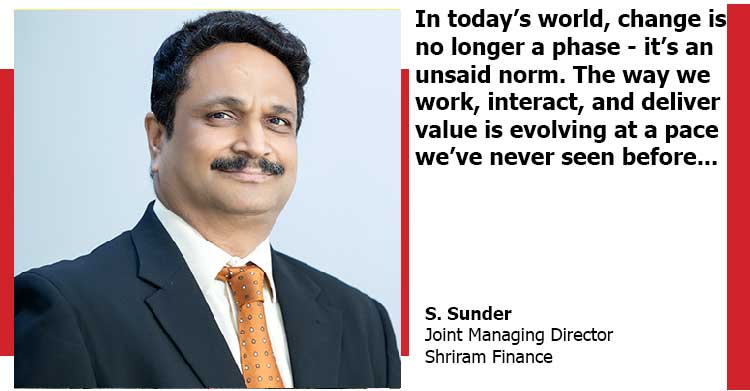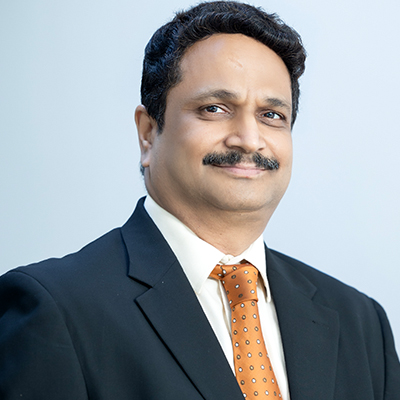Unlearn, Relearn, Thrive: Embracing Growth in a Rapidly Changing Workplace | S. Sunder | Joint Managing Director | Shriram Finance

In today’s world, change is no longer a phase—it’s an unsaid norm. The way we work, interact, and deliver value is evolving at a pace we’ve never seen before. Technology is rewriting rules across industries, customer expectations are rising, and workplaces are becoming more diverse and digitally driven. In such a landscape, the ability to keep up is not a luxury—it’s a necessity.
The Courage to Unlearn
Unlearning sounds counterintuitive. Why let go of what we’ve spent years mastering? But the truth is, not everything we once knew continues to serve us. Practices that made perfect sense a decade ago may no longer be relevant in a world shaped by artificial intelligence, machine learning, and hybrid work environments.
Unlearning is not about discarding our past experiences. It’s about questioning long-held assumptions, identifying what’s outdated, and making space for new ways of thinking and working. That’s not easy—especially for experienced professionals who have built their identities around specific expertise. But in many cases, what got us here won’t get us there.
For example, traditional top-down leadership styles may have worked well in rigid hierarchies. But today’s teams thrive in agile, collaborative, and inclusive setups. Leaders must now unlearn the need to control every decision and instead empower their teams to innovate, experiment, and grow.
The Discipline to Relearn
Unlearning alone isn’t enough. Once we let go of what no longer serves us, we must actively seek out new skills and perspectives to stay aligned with the times. This is where relearning comes in—an ongoing process of equipping ourselves for what lies ahead.
Digital skills are no longer optional. From sales teams using CRM systems to back-end teams adopting automation tools, technology has become part of every role. At the same time, soft skills like empathy, adaptability, and cultural intelligence are becoming equally crucial, especially in a world that values collaboration across geographies and generations.
The challenge, however, is making learning a priority amid packed schedules and operational pressures. Many professionals find it difficult to carve out time for upskilling. That’s why it’s essential for organizations to integrate learning into the flow of work—so it doesn’t feel like an added burden but a part of how we operate every day.
Making Learning Part of Our Culture
For relearning to truly take root, learning must be woven into the culture of the organization. We see learning not as a checkbox activity, but as a core business enabler. It begins with leadership—when managers demonstrate curiosity and encourage team members to ask questions, explore alternatives, and try new approaches, it sets the tone for a learning-first culture.
This kind of culture thrives on psychological safety. Employees must feel comfortable admitting what they don’t know and be confident that they’ll be supported—not judged—for seeking help or proposing fresh ideas. A culture that rewards learning over perfection is one that fosters long-term resilience.
Solving for Time and Relevance
One of the biggest barriers to learning in the workplace is time. Employees are often juggling multiple priorities and can’t afford to spend hours in training programs. That’s where microlearning comes in. Short, focused modules—delivered in five or ten minutes—can fit easily into daily workflows and are more likely to be retained and applied.
Equally important is relevance. Adults learn best when they see a clear connection between what they’re learning and their current challenges. For instance, if we’re introducing AI tools into customer service, training shouldn’t just focus on how to operate the tool, but also on how to blend automation with human empathy to enhance customer experience.
Peer learning also plays a key role. Internal webinars, knowledge-sharing circles, and reverse mentoring programs help employees learn from one another and create a sense of shared growth. It reinforces the idea that learning doesn’t just come from external sources—it can also come from our colleagues sitting right next to us.
Shifting Mindsets: From Expert to Learner
Perhaps the biggest shift we need to make is psychological. Many professionals derive confidence from being seen as experts. Starting from scratch—even metaphorically—can be unsettling. But in a world that’s constantly changing, expertise needs to be fluid. The real value lies in our ability to keep evolving.
This mindset shift—from proving we know everything to continuously improving what we know—is liberating. It allows us to lead with curiosity rather than fear, to ask better questions, and to be open to ideas that challenge our assumptions. In doing so, we become not only better professionals but also better collaborators, listeners, and problem-solvers.
What Thriving Really Means
So, what does it mean to thrive in the modern workplace?
It means staying resilient when the world around us changes. It means responding quickly and thoughtfully to new opportunities. It means being deeply committed to personal growth—and encouraging that same spirit in our teams.
For organizations, thriving means building structures that allow people to learn, adapt, and contribute meaningfully. It means recognizing that people are not just resources—they are partners in progress. It’s about creating environments where curiosity is celebrated, where innovation is nurtured, and where change is not feared, but welcomed.
A Shared Responsibility
The future of work belongs to those who are willing to learn continuously. But this is not the responsibility of individuals alone. Organizations must create the right environment—through leadership, systems, and incentives—for learning to flourish. This includes giving people the tools they need, the time to grow, and the trust to take risks.
It is a crossroad of rapid change and immense opportunity, therefore it is imperative to make a conscious choice: to evolve, to grow, and to lead with a mindset that’s built not on what we know, but on what we’re ready to discover.


